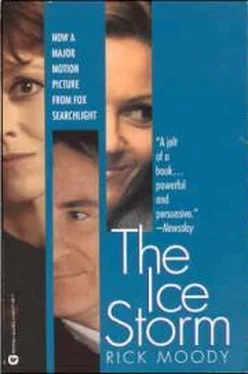First his face grew terribly red and he began to foam at his mouth. His teeth chattered and his hair began to cook. Then his heart stopped. This happened almost immediately. His heart seized up, arrested. It was a strong, young heart, untroubled by erratic beating, or by any sort of buildup in the arteries, but it gave out anyway. He was magnetized, because that’s one thing electricity can do, magnetized to the cable, but after he died, after the electricity in him that was his own, that was the accumulation of his fears and affections, traveled out into the ether, his body, his remains, slumped over backward, smoking a little bit. His hands were scorched black from where they held the cable. He smoked from the ears and bled from the nose and mouth. He slumped over backward, fell off the guardrail — because gravity was stronger in this instance, and because the capricious live wire was now dancing in another direction — and he rolled backward down the hill a little bit, down under a shrub on the furthest edge of the property belonging to Silver Meadow. A corner of his orange ski jacket was visible from the road, but you needed to be looking to see it.
This moment passed twice. Once, in the simple narrative of that night, the narrative belonging to the town of New Canaan, and once in the last instant of Mike’s consciousness. And so this second account is appended here. Suddenly, Mike’s weariness and remorse, his regret about having left the house to wander the streets without ever being caught, without ever being searched for, overcame him. His hands were raw and aching. He was chastened. He longed for the consolations of some imagined and perfect family. He sat because he was tired, just plunked himself down ass first, and then steadied himself by grabbing the cable. No preliminary warning troubled him. Maybe there ought to have been a noise or a shock when the downed electrical lines touched the guardrail, but the shock of that night was so routine he wouldn’t have noticed if there had been. The sound of hissing, the ominous sound of modern technology loose in nature — Mike was used to all that. That was his language.
His last thought, a simple, adolescent oh, no, was all he had time for; in fact it was exactly simultaneous with his electrocution, because through some strange celestial circuitry, he knew at the moment of his death that it was his death. A jumble of images appeared at once to him, a jumble of dreams and recollections, condensed and displaced. And then Mike said, oh, no, subvocalized it. And then his consciousness split from this plane:
Benjamin Hood knew nothing of Mike Williams when he awoke on the floor of the bathroom at the Halfords’ place. Sometime before dawn. Throat parched, throat napalmed, Agent Oranged. Mouth full of canker sores. The sinister combs, of all shapes and stripes, plastic and onyx, contemporary and antique, the combs that decorated Dot’s half-bath, pressed in against him. He guzzled water from the spigot, his lips curled unsanitarily around it. He was unshaven. His ascot had disappeared somewhere. He wondered if his overcoat was still in the guest room by the front door, and if his wallet was in it.
The modern domestic tale always features the ordeal and dismemberment of a father. This was the dim certainty to which Hood awoke. His consciousness had closed down, had narrowed down to a dot, like the old monochrome television sets when you shut them off. Sometime in the midst of the party his consciousness had closed down. He wasn’t sure how he had arrived in the bathroom, how he had spilled these flecks of upchuck on himself.
Gray, isolated moments of conversation returned. He had a vivid recollection of being inches from his wife’s face and, in the midst of some debate, losing control of his own saliva, so that a tusk of the stuff protruded from his cavernous and angry mouth. Later, he remembered trying to speak to Rob Halford, trying to apologize for something and finding himself suddenly, inappropriately alone. Halford had just walked out of the conversation, had simply walked away without excuse or apology. Hood had been in the middle of a sentence, in the middle of a heartfelt confession, and Rob had simply given up on him. Benjamin was treated with contempt at these parties, it became obvious to him now. He was treated like a common bum. And like a bum he remembered finishing his conversation out loud, to himself. In isolation. Alone.
Now he wandered the spotless first floor of the Halfords’ house as though its emptiness was his responsibility. None of the lights worked. The clocks were stopped. Hood’s coat remained on the bed in the guest room where he had left it. It was like a disconsolate body spread there. In the front hall, his keys lay in the salad bowl, unchosen from the night before.
So Benjamin Hood left the way he had come, trying to undo what faulty recollections he had of the evening’s mindless pleasures. He’d felt worse, but not that he could remember. Outdoors he came face-to-face with the crippling elements. The ice was like some polystyrene coating that separated him from the world, some wax curtain that pronounced his guilt — guilty of drunkenness, of boorish-ness, of adultery, of forging a bad relationship with chance. Guilty of presuming upon chance. Guilty of weakening and diluting what bonds of family remained in his family. Guilty of following bad impulses to their bad conclusions. He was quarantined and he deserved it.
At least the Firebird remained in the driveway. But the driver’s-side lock was frozen. This was just the next embarrassment. He didn’t even curse. He undertook that procedure well known in more northerly climates. It was time-consuming but he had time. Back into the house. Boil water. Bring water (in a teacup) and a key and towel out to car. Immerse key. Dry vigorously, quickly. Insert warm, dry key into lock. And this proved effective. The next hurdle was the ice frozen onto the windshield. In these small contretemps, it was surprising and rewarding to Hood that the larger questions of that morning — where his wife might be, what his children were going to think — were lost. He involved himself in scraping the windshield with one of those ineffective plastic scrapers — this one had the name of a dry cleaner on it — and this involvement seemed to take all morning. It was good.
The whole world was white and gray as he inched down Ferris Hill. He passed the cars parked along the road, or stalled in the ditch. The conifers, weighed down with ice and snow, were shrouded mourners. His heart lurched when he saw Jim Williams’s Cadillac folded up on a fallen tree. Hood left the Firebird running, coughing, and popping, as he skidded and trotted out to be sure there was no one inside the wreck. There were no faint footprints around the car. And there was no one inside.
This drive home. Holy Center Approaching. He would put it all behind him. Towing vehicles, emergency vehicles, these chasers of calamity had proven ineffectual. But Benjamin Hood’s protectorate, the gale that had buffeted him from one situation to another, was at last blowing in a good direction. That was clear. (The Williamses’ house looked as abandoned as the Halfords’.)
And then he reached the fallen tree and telephone pole, the roadblock just down the hill.
He sat in the car for some minutes. There was a live wire, up there, a goddam live wire. Where were these utility guys when you needed them? Were tires an effective ground? If the wire somehow snaked up the street and zapped his Firebird would he be safe? How long had this situation been this way? He didn’t know whether to get out or to await further instructions. At last, Benjamin Hood, scaly and unlovable, decided to act. He would telephone from Silver Meadow. He shut the car off — with emergency lights flickering — stepped carefully out of the car, and then sprinted twenty feet back up the road, stumbling on the ice. His girth heaved, his chest exploded, the frigid air daggered his lungs. His migrainous headache blossomed. But he was still alive. He stepped over the guardrail and down the embankment, intending to give the live wire a wide berth, and that was when he chanced upon Mike Williams.
Читать дальше












